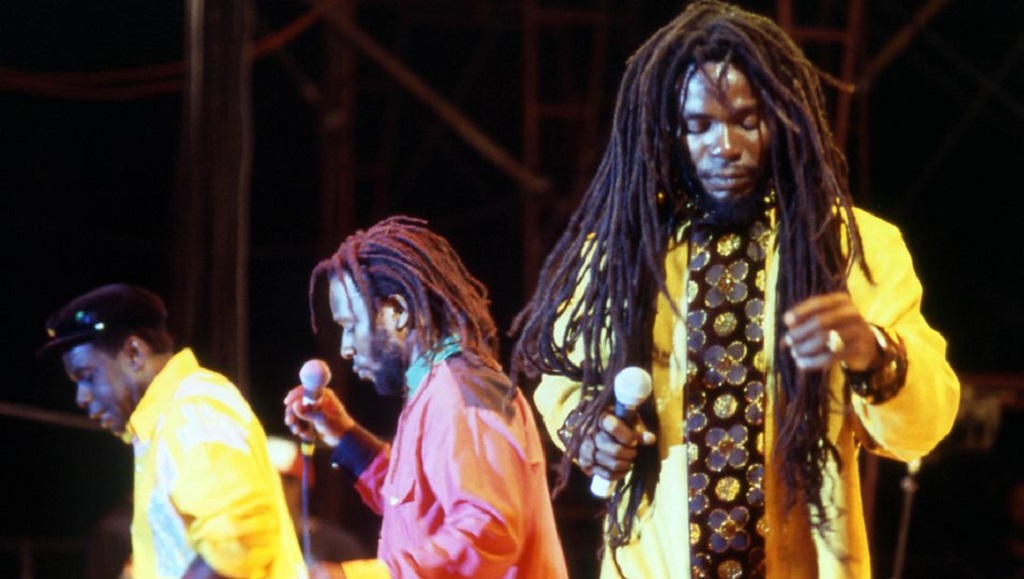The 1976 debut album from reggae trio Mighty Diamonds doesn’t usually get lumped in with other roughly contemporary works of Jamaican revolutionary agit-prop, and the reasons why aren’t difficult to comprehend. Burning Spear’s Marcus Garvey, the Abyssinians’ Satta Massagana, and Culture’s Two Sevens Clash all spelled out their apocalyptic intentions — even the album titles promised deep dives into sufferation. While Burning Spear’s dense tribute to Jamaica’s Pan-Africanist visionary featured the dignified visage of Garvey himself as artwork, the Diamonds took to Right Time’s cover as a bare-chested trio seated just below their name spelled out in precious gemstones. Yet lead vocalist Donald “Tabby” Shaw and backup support Fitzroy “Bunny” Simpson and Lloyd “Judge” Ferguson reference the Black Star Line’s founder as insistently as any other analogous roots outfit: Shaw’s first full verse goes “Marcus Garvey prophesy say.” Four songs later, “Them Never Love Poor Marcus” heaps vitriol on Bag O’ Wire, Garvey’s personal driver and supposed betrayer, so named after going mad and wrapping himself in tires which shed their rubber down to the wires, ie, “Men like Bag O’ Wire / Should burn in fire.” “I Need a Roof” opens with a request to “Remember Garvey say,” while album closer “Africa” makes explicit the Garveyite goal of repatriation. Factor in songs of praise to a “Natural Natty” and calls for fellow Rastas to “Go Seek Your Rights,” along with heartfelt pleas for black brothers to stop slaughtering each other, all within a ten-song, thirty-one minute album. Minute for minute, the Diamonds practically outdo Public Enemy on the political front.
Right Time hardly registers as doomsday prophesy — it’s more like the O’Jays getting AM radio to croon along with an anthem about sexual betrayal.
Yet Right Time hardly registers as doomsday prophesy — it’s more like the O’Jays getting AM radio to croon along with an anthem about sexual betrayal. The Diamonds clearly patterned themselves after various Motown and Philadelphia International vocal outfits, along with assorted lovermen of the post-Rocksteady era, and so even the cruelest couplets go down smoothly, with “weeping and wailing and moaning and gnashing of teeth” wedded to one of the catchiest melodic refrains on the entire album. Likewise, for all their talk of revolution, the Diamonds knew how to sell a simple line of teenage heartache, with “Shame and Pride’s” keystone “I used to see you wait / By the schoolyard gate” delivered with sweet melancholy. That song predated Right Time by several years, having made some noise on Jamaican charts in 1973 during their early rise to the top ranks of the new Channel One record label. By the time Virgin scooped the trio up along with Johnny Clarke and Big Youth during a cash-mad scouting expedition, the Diamonds had enough Channel One singles stockpiled to fill out the better part of a full-length — another reason for the album’s consistency. And we haven’t yet discussed what might be this album’s greatest offering: the introduction proper of Sly Dunbar and Robbie Shakespeare as the greatest rhythm duo of the decade and beyond. Despite eventually laying down bass/drums on well nigh 200,000 individual recordings, Right Time still holds pride of place in Dunbar’s mind, with his double tap across the rim on the title cut confounding listeners — surely it was some studio trick? But no, just technical mastery, paired effortlessly with three-way harmonies. As a follow-up, Mighty Diamonds decamped to New Orleans to cut the overstuffed Ice on Fire with Allen Toussaint, a reminder that sometimes genius is local. One decade later, Sly and Robbie would cut the epochal Bill Laswell-aided Rhythm Killers, which one might argue proves that genius is also sometimes universal.
Part of Kicking the Canon – The Album Canon.


Comments are closed.